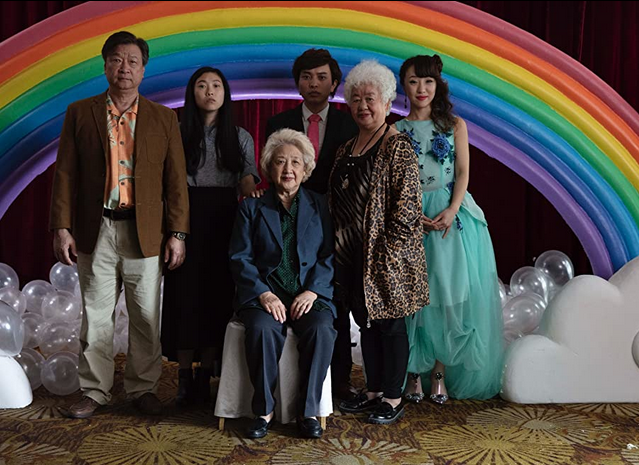The Farewell (dir. Lulu Wang, 2019) - Review
Download The Farewell screenplay for personal, private, educational use.
When Lulu Wang initially recounted the tale of her family’s unusual struggle with a cancer diagnosis, she did so in documentary format, on an episode of radio show This American Life broadcast in 2016. The reaction was tremendous; among the flurry of calls and emails from producers and studios, the Oscar-nominated screenwriter Chris Weitz stood out, not only for the speed with which he expressed interest, but, as Wang recalled, for the way in which he seemed to grasp her message. "It was a rare story in which nobody was wrong," remembered Weitz. "It really didn’t have any cliche in it, either.” (Hollywood Reporter, January 2020)
Weitz’s attitude reflected the approach of a careful adaptation, which Wang’s screenplay and direction meticulously steered around the pitfalls of pastiche, melodrama, and inauthenticity, despite the complex subject matter. The Farewell tells the loosely fictionalised story of Wang’s avatar, Billi (Nora Lum, aka Awkwafina), a struggling Chinese-American writer in New York, who learns that her beloved grandmother, or Nai Nai, in Changchun, has a terminal lung cancer diagnosis.
Although the doctors have given Nai Nai months to live, her family agree not to tell her, and instead rush through a wedding so they have an excuse to reconvene in China and say goodbye. “Chinese people have a saying: when people get cancer they die,” observes Billi’s mother, Jian (Diana Lin). “It’s not cancer that kills them, it's the fear.” On these ethical grounds, the family begin pushing the bounds of not only how far their white lie can stretch, but of their own self-deception, as they try to celebrate a wedding whilst concealing their grief.
Aside from its heavy themes of death, deception, and career failure, The Farewell faced the additional potential encumbrance of its Asian focus. “Ethnic American films are almost like a genre in and of itself. As soon as you say, ‘This is about my family. There is a wedding. It’s Asian,’ it is immediately put into this box of a broad comedy like My Big Fat Greek Wedding,” said Wang in the same 2020 Hollywood Reporter piece. Armed with the non-negotiable terms that the film would be Chinese language, feature an entirely Asian and Asian-American cast, and that “she will not have a white boyfriend,'" Wang was able to steer clear of soapiness or inauthenticity, in favour of an intimate mix of farce and melancholy, intermingling family members playing themselves alongside international stars.
The result is a hilarious yet touching depiction of one diasporic Chinese family’s encounter with death. From Billi’s Americanised perspective, Nai Nai has a right to know the fate which the doctors help to conceal. But her uncle counters with the prevailing view that "your life does not belong to you. You are part of a whole: a family, a society.” The deception becomes an act of love, a communal shouldering of Nai Nai’s sadness and burden, a familial responsibility, which Nai Nai bore out for her late husband. Meanwhile the blissfully oblivious Nai Nai, played by doyenne of Chinese film and TV Zhao Shuzhen, continues planning the wedding, making dim sum, and energetically practicing Tai Chi.
The film creates both humor and poignancy in the contrast between Nai Nai’s vivacity and the family’s attempts to restrain themselves from mourning her too blatantly; the climactic wedding of Billi’s beleaguered Japanese cousin blurs farcical hijinks over a drinking game with the family breaking down during their speeches. The constant refrain of “tears of joy”, when Nai Nai questions why everyone is crying so much, provokes melancholy as the groom blubbers uncontrollably during the family portrait with his new bride.
After a tear-jerking closing shot of Billi heading back to New York, never to see her grandma again, the fade to black blooms into footage of the real Nai Nai — still alive and zesty six years later. Incredibly, Nai Nai, and the family secret, survived long enough for her to discover both the deception and her diagnosis via her granddaughter’s critically acclaimed film about it. As Wang explained in early 2020:
“And so she said to little Nai Nai, her sister, who plays herself in the movie, she said:
“I just thought that you were really daft, because you went and shot a movie, you went to the premiere in New York, and you come back and you can’t tell me anything about it. You can’t tell me what it’s about. You can’t tell me the title. But look, it says in the newspaper it’s called Don’t Tell Her, and that’s why you didn’t tell me.”
But we haven’t talked about it, so I’ll see what happens when I see her.” (Slate, January 2020).
Áine Kennedy is a London-based writer and manager of the ScriptUp blog.





